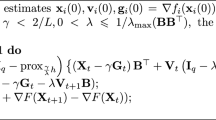Abstract
A form of iterative learning control (ILC) is used to update the set-point for the local controller. It is referred to as set-point-related (SPR) indirect ILC. SPR indirect ILC has shown excellent performance: as a supervision module for the local controller, ILC can improve the tracking performance of the closed-loop system along the batch direction. In this study, an ILC-based P-type controller is proposed for multi-input multi-output (MIMO) linear batch processes, where a P-type controller is used to design the control signal directly and an ILC module is used to update the set-point for the P-type controller. Under the proposed ILC-based P-type controller, the closed-loop system can be transformed to a 2-dimensional (2D) Roesser’s system. Based on the 2D system framework, a sufficient condition for asymptotic stability of the closed-loop system is derived in this paper. In terms of the average tracking error (ATE), the closed-loop control performance under the proposed algorithm can be improved from batch to batch, even though there are repetitive disturbances. A numerical example is used to validate the proposed results.
Similar content being viewed by others
References
M. Uchiyama. Formulation of high-speed motion pattern of a mechanical arm by trial. Transactions of the Society of Instrument and Control Engineers, vol. 14, no. 6, pp. 706–712, 1978. (in Japanese)
S. Arimoto, S. Kawamura, F. Miyazaki. Bettering operation of dynamic systems by learning: A new control theory for servomechanism or mechatronics system. In Proceedings of the 23th Conference of Decision and Control, Las Vegas, pp. 1064–1069, 1984.
X. H. Bu, Z. S. Hou. Stability of iterative learning control with data dropouts via asynchronous dynamical system. International Journal of Automation and Computing, vol.8, no. 1, pp. 29–36, 2011.
A. Tang, D. Xiao, Z. Z. Mao. Batch-to-batch iterative learning control of a batch polymerization process based on online sequential extreme learning machine. Industrial & Engineering Chemistry Research, vol. 48, no. 24, pp. 11108–11114, 2009.
D. H. Owens, K. Feng. Parameter optimization in iterative learning control. International Journal of Control, vol. 76, no. 11, pp. 1059–1069, 2003.
W. S. Chen, R. H. Li, J. Li. Observer-based adaptive iterative learning control for nonlinear systems with time-varying delays. International Journal of Automation and Computing, vol. 7, no. 4, pp. 438–446, 2010.
Y. Wang, F. Gao, F. J. Doyle. Survey on iterative learning control, repetitive control, and run-to-run control. Journal of Process Control, vol. 19, no. 10, pp. 1589–1600, 2009.
J. H. Wu, H. Ding. Reference adjustment for a high-acceleration and high-precision platform via A-type of iterative learning control. Journal of Systems & Control Engineering, vol. 221, no. 5, pp. 781–789, 2007.
J. X. Xu, R. Yan. Iterative learning control design without a priori knowledge of the control direction. Automatica, vol. 40, no. 10, pp. 1803–1809, 2004.
P. Jiang, L. C. A. Bamforth, Z. Feng, J. E. F. Baruch, Y. Q. Chen. Indirect iterative learning control for a discrete visual servo without a camera-robot model. IEEE Transactions on Systems, Man, and Cybernetics, vol. 37, no. 4, pp. 863–876, 2007.
G. M. Bone. A novel iterative learning control formulation of generalized predictive control. Automatica, vol. 31, no. 10, pp. 1483–1487, 1995.
A. Tayebi, C. J. Chien. A unified adaptive iterative learning control framework for uncertain nonlinear systems. IEEE Transactions on Automatic Control, vol. 52, no. 10, pp. 1907–1913, 2007.
K. K. Tan, S. Zhao, J. X. Xu. Online automatic tuning of a proportional integral derivative controller based on an iterative learning control approach. IET Control Theory & Applications, vol. 1, no. 1, pp. 90–96, 2007.
Y.Wang, F. J. Doyle. Stability analysis for set-point-related indirect iterative learning control. In Proceedings of the 48th IEEE Conference on Decision and Control, IEEE, Shanghai, PRC, pp. 5702–5707, 2009.
Y. Q. Ye, D. W. Wang. Learning more frequency components using P-type ILC with negative learning gain. IEEE Transactions on Industrial Electronics, vol. 53, no. 2, pp. 712–716, 2006.
T. Kaczorek. Two-dimensional Linear Systems, Berlin, Germany: Springer-Verlag, 1985.
J. Shi, F. Gao, T. J. Wu. Robust design of integrated feedback and iterative learning control of a batch process based on a 2D Roesser system. Journal of Process Control, vol. 15, no. 8, pp. 907–924, 2005.
G. I. Bara, M. Boutayeb. Static output feedback stabilization with H ∞ performance for linear discrete-time systems. IEEE Transactions on Automatic Control, vol. 50, no. 2, pp. 250–254, 2005.
S. P. Boyd, L. E. Ghaoui, E. Feron, V. Balakrishnan. Linear Matrix Inequalities in System and Control Theory, Philadelphia, USA: Society for Industrial Mathematics, 1994.
Author information
Authors and Affiliations
Corresponding author
Additional information
This work was supported by National Natural Science Foundation of China (No. 60874116) and Natural Science Foundation of Hebei Province (No. F2009000857).
Zhen-Yu Huo received the bachelor and master degrees from Hebei University of Technology, PRC in 2001 and 2011, respectively. He is currently a lecturer at Hebei University of Engineering, PRC.
His research interests include electrical engineering, iterative learning control, and robust control.
Zhu Yang received the bachelor degree from Hebei Normal University, PRC in 2003. She is currently a postgraduate at Hebei University of Technology and a lecturer at Hebei University of Engineering, PRC.
Her research interests include rough sets theory and its application, and stochastic process.
Yan-Jun Pang received the bachelor degree from Hebei Normal University, PRC in 1984. He is currently a professor at Hebei University of Engineering, PRC.
His research interests include uncertainty mathematics expression and processing of information.
Rights and permissions
About this article
Cite this article
Huo, ZY., Yang, Z. & Pang, YJ. Set-point-related indirect iterative learning control for multi-input multi-output systems. Int. J. Autom. Comput. 9, 266–273 (2012). https://doi.org/10.1007/s11633-012-0643-3
Received:
Revised:
Published:
Issue Date:
DOI: https://doi.org/10.1007/s11633-012-0643-3




